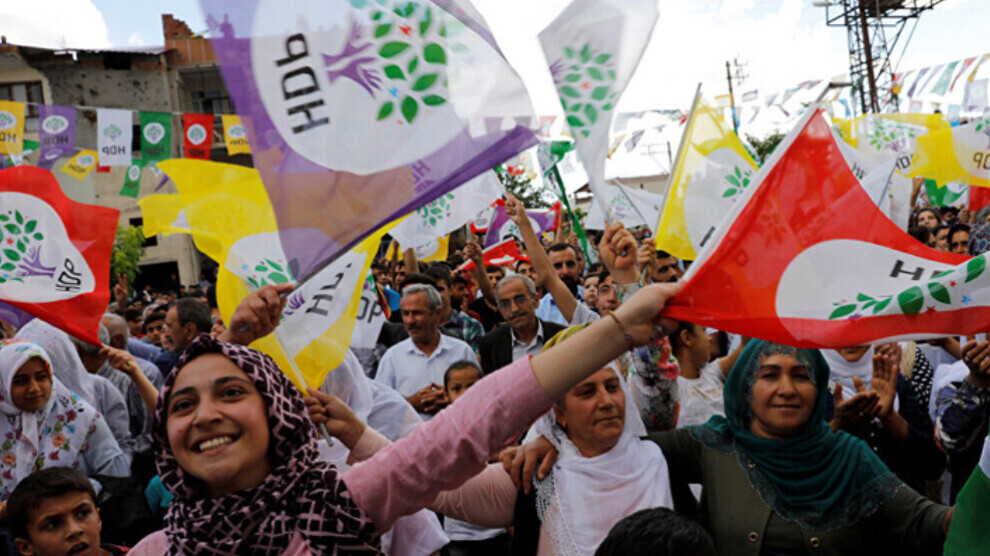HDP releases report called 'Systematic Oppression as the Basis for Erdogan’s New Turkey’
The HDP has released a report called 'Systematic Oppression as the Basis for Erdogan’s New Turkey’.
The HDP has released a report called 'Systematic Oppression as the Basis for Erdogan’s New Turkey’.

Recep Tayyip Erdogan's 'New Turkey' is defined by intimidation of the democratic opposition, prosecution of the Peoples' Democratic Party (HDP), and extermination of any remnants of civil society." This is how the report called Systematic Oppression as the Basis for Erdogan’s ‘New Turkey’ published by the HDP Representation in Europe begins.
The report states: "Overseas, the 'New Turkey' manifests itself as blackmailing the European Union, intervening in neighboring countries, and employing ruthless military aggression. Another aspect of `New Turkey ́ is that Erdogan's Justice and Development Party (AKP) has built a coalition with the ultra-nationalist right-wing Nationalist Movement Party (MHP) to stay in power.
Lack of democracy in Turkey is by no means a new or recent issue. It has deep-rooted causes that date back to the foundation of the state. Yet, throughout the course of Turkish history, the struggle for a democratic Turkey has never stopped – and it is still going on. When the AKP came into power in 2002, Erdogan, as party chairman, declared to both the “nation” and the “international community” that the AKP would pursue a policy geered towards a stable and democratic Turkey."
The report adds: "According to this, the collective rights of unrepresented people and of women, and the elements of democratic society should have been ensured in a new Turkish constitution. And the ‘Policy of Zero Problems with our Neighbors’ should have been adopted in response to the rapid changes engulfing the world. In a nutshell, Erdogan convinced both the national and international community that Turkey’s deep-rooted problems, including the Kurdish question, would be resolved within the framework of democratisation.
In contrast to this rhetoric, the weak Turkish democracy regressed further: the rule of law and international conventions were permanently abused, and transparency and accountability were laid aside. Today, exercising any of the democratic rights ostensibly guaranteed by law is de-facto prohibited. Under his authoritarian regime, Erdoğan proclaims "the new Turkey”. But there are structural and political problems. He is dismantling the last remnants of democracy and trying to eliminate his opponents by any means in order to institutionalise his regime."
Within this framework, continues the report "the HDP, the second largest opposition party, is subjected to constant prosecutions, and its members, deputies and co-mayors are unlawfully arrested and dismissed, despite acting in compliance with the law. At the same time, “New Turkey’s” foreign policy, which is described as ‘pre-emptive rather than being reactive’, consists of training and equipping the extremist armed groups – including Islamic State (Daesh) – that fueled wars in Iraq, Syria, Libya, and Nagorno-Karabakh. In today’s “New Turkey”, social justice, peace, and the democratic development of the Republic are no longer in effect. The deteriorating situation also jeopardises hopes for peace and prosperity in the wider Middle East."
Elected municipalities replaced by unelected government-appointed trustees
Following the local elections held on 31 March 2019, Erdogan replaced the elected representatives in 49 out of the 65 municipalities won by the HDP with government- appointed trustees. These municipalities included three metropolitan areas, five provinces and 33 districts. 37 municipal co-chairs including 19 women, were imprisoned. As of 31 March, 15 co-mayors, including Diyarbakır Metropolitan Co- Mayor Adnan Selçuk Mızraklı, co-mayor of Kars Ayhan Bilgen and seven women, remain in detention. A further six co-mayors are under house arrest.
The HDP report states: "One result of the coalition between the AKP and the MHP is that policy against the Kurds and other religious and ethnic groups has become increasingly aggressive. To keep hold of power even in an economic crisis, the Government, and its coalition partner the MHP (whom they made the Turkish type presidential system together), have brought forward war in Syria and Iraq and pursued a policy of annihilation against the Kurds in Turkey, Syria and Iraq. As a result, the peace process initiated by Abdullah Öcalan from Imrali prison has been stopped since 2015. As long as the road of dialogue for peace is closed off, violence will go on. The political strategy of the government under Erdogan is based on authoritarianism, a feudalistic interpretation of Islam, coalitions with nationalists and radical jihadists, violence, war and oppression – all this leads to a dead end."
The report ends with the following remarks:
"Turkey has moved away from democracy and plunged into authoritarianism. The state apparatus and institutions are being reconfigured to control state mechanisms. The primary task of the reconfigured state has become the suppression of democratic organisation so as to make space for the authoritarian regime. Democratic regression is observed in every sphere of life, damaging society both economically and morally.
The HDP plays a crucial role in ensuring the democratic rights of the Kurdish people, in building peace, and in bringing forward the democratisation of Turkey. The political achievements that the HDP managed to obtain through Turkey’s weak democracy can also help other communities to work together for coexistence and democracy. But if Turkish democracy is allowed to regress further this will have severed consequences, not just regionally but also internationally. If democracy is to be strengthened, the Turkish government needs to be encouraged to accept the HDP's significant role.
We are asking international organisations – the United Nations, the Council of Europe, the European Union, and European governments – to sustain the necessary political pressure on the Turkish government so that they commit to human rights conventions and international law. Whenever Erdogan’s "new Turkey" is accepted internationally as a "legitimate" partner, wars, violence, occupations, oppression, persecution, and imprisonment become normalised. These acts should not be normalised."